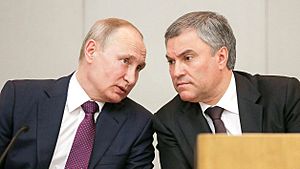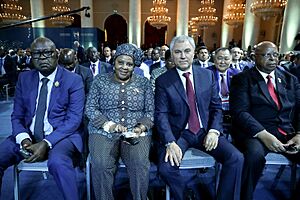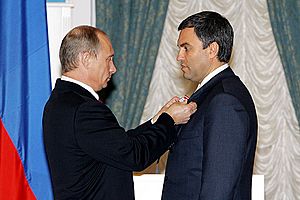Vyacheslav Volodin facts for kids
Quick facts for kids
Vyacheslav Volodin
|
|
|---|---|
| Вячеслав Володин | |
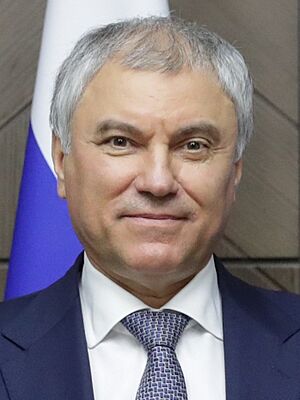
Volodin in 2024
|
|
| Chairman of the State Duma | |
| Assumed office 5 October 2016 |
|
| Preceded by | Sergey Naryshkin |
| Member of the State Duma for Saratov Oblast | |
| Assumed office 12 October 2021 |
|
| Preceded by | Olga Alimova |
| Constituency | Saratov (No. 163) |
| In office 29 December 2003 – 24 December 2007 |
|
| Preceded by | Nikolay Sukhoy |
| Succeeded by | Constituencies abolished |
| Constituency | Balakovo (No. 156) |
| Member of the State Duma (Party List Seat) | |
| In office 5 October 2016 – 12 October 2021 |
|
| In office 24 December 2007 – 21 December 2011 |
|
| In office 18 January 2000 – 29 December 2003 |
|
| First Deputy Chief of Staff of the Presidential Administration of Russia | |
| In office 27 December 2011 – 5 October 2016 |
|
| Preceded by | Vladislav Surkov |
| Succeeded by | Sergey Kiriyenko |
| Deputy Prime Minister of Russia — Head of the Government Executive Office | |
| In office 21 October 2010 – 27 December 2011 |
|
| Preceded by | Sergey Sobyanin |
| Succeeded by | Anton Vaino |
| Parliamentary leader of Fatherland – All Russia | |
| In office 2001–2003 |
|
| Preceded by | Yevgeny Primakov |
| Succeeded by | Boris Gryzlov (as Parliamentary leader of United Russia) |
| Personal details | |
| Born | 4 February 1964 Alekseyevka, Saratov Oblast, Soviet Union |
| Political party | United Russia |
| Other political affiliations |
Fatherland – All Russia |
| Alma mater | Saratov State Agrarian University Russian Presidential Academy of National Economy and Public Administration |
| Profession | Lawyer |
| Website | (former) |
Vyacheslav Viktorovich Volodin (born 4 February 1964) is a Russian politician. He has been the 10th Chairman of the State Duma since 2016. The State Duma is like the main parliament in Russia, where laws are made.
Mr. Volodin used to work closely with President Vladimir Putin. He was also the Secretary-General of the United Russia party. He served as a member of the State Duma from 1999 to 2011, and again from 2016 until now. Before becoming Chairman of the State Duma, he was a Deputy Prime Minister of Russia and a top official in the Presidential Administration of Russia.
Contents
Early Life and Education
Vyacheslav Volodin was born on 4 February 1964. He grew up in a village called Alekseyevka in the Saratov region of Russia. His father was a river boat captain who passed away when Vyacheslav was young. His mother was a primary school teacher.
He studied mechanical engineering at the Saratov State Agrarian University, graduating in 1986. Later, he earned a law degree from the Russian Presidential Academy of National Economy and Public Administration in 1995. He also received a PhD in law in 1996. While studying, he worked as a lecturer.
Political Career
Starting in Regional Politics
Mr. Volodin began his political journey in 1990. He was elected to the Saratov City Duma, which is a local council. By 1992, he became a Deputy Head of Administration for Saratov. He then served as Deputy Chairman of the Saratov Oblast Duma in 1994. In 1996, he was appointed Vice Governor of the Saratov region.
Serving in the State Duma
In 1999, Vyacheslav Volodin was elected to the State Duma, Russia's national parliament. He became a deputy chairman of the Duma. From 2001, he led the Fatherland – All Russia political group.
He was re-elected to the State Duma in 2003. He continued to serve as deputy chairman. He also became a key leader in the United Russia party, which was founded in 2001. From 2005, he was the party's Secretary-General. He was elected to the State Duma again in 2007.
Roles in Government
In October 2010, Mr. Volodin was appointed Deputy Prime Minister of Russia. He also became the Chief of Staff for the Presidential Administration of Russia. These were important roles in the Russian government.
From 2012 to 2016, he served as the First Deputy Chief of Staff of the Presidential Administration. In this role, he was involved in domestic policy. He worked on ways to understand and respond to public discussions online.
International Sanctions
In 2014, some countries placed sanctions on Mr. Volodin. This happened after the annexation of Crimea by the Russian Federation. The U.S. Treasury and the European Union added him to their sanctions lists. This meant he could not travel to these countries, and any assets he held there were frozen. The Government of the United Kingdom also sanctioned him.
Chairman of the State Duma
Becoming Chairman
Rumors about Mr. Volodin becoming the Chairman of the State Duma started before the 2016 elections. After the 2016 Russian legislative election, the previous Chairman, Sergey Naryshkin, moved to a different role.
On 23 September 2016, President Vladimir Putin suggested that United Russia nominate Volodin. Other political parties also supported him. On 5 October 2016, Vyacheslav Volodin was elected Chairman of the State Duma. He received 404 votes.
Re-election in 2021
In 2021, Mr. Volodin was nominated again to lead the 8th State Duma. He was re-elected Chairman on 12 October 2021. He won with 360 votes.
His Time as Chairman
Since becoming Chairman, Mr. Volodin has been a very influential politician in Russia. Surveys show that many Russians know who he is and have a positive view of his work.
He has worked to improve discipline among the members of the Duma. For example, he made sure that deputies attend meetings in person. He also introduced fines for missing meetings without a good reason.
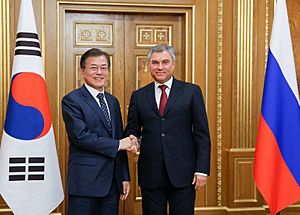
In 2019, Mr. Volodin suggested changes to the Constitution of Russia. He wanted the State Duma to have a bigger role in choosing government ministers. He believed this would create a better balance of power. President Putin later supported these ideas.

In January 2022, Mr. Volodin stated that Russia would not go to war with Ukraine. However, on 24 February 2022, he supported the 2022 Russian invasion of Ukraine. He said its purpose was to "protect people living in Ukraine." He also stated that "demilitarizing Ukraine" was the "only path" to prevent war in Europe.
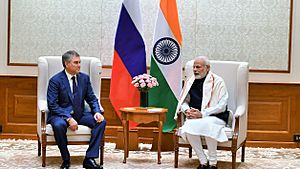
In July 2022, Mr. Volodin made a statement about Alaska. He suggested Russia could ask for Alaska back if the United States continued to seize Russian assets.
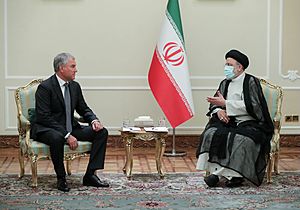
In September 2022, he met with Chinese politician Li Zhanshu. He also claimed that NATO forces were fighting against Russian soldiers in Ukraine. He stated that Ukraine "has lost the ability to exist as a state."
In January 2023, Mr. Volodin called Russians who left the country "scoundrels." He suggested their properties in Russia should be taken. He has repeatedly called Russians who left "traitors."
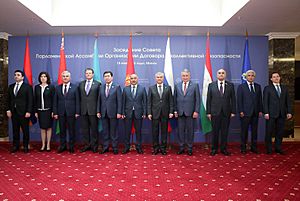
In March 2023, the State Duma hosted a conference with African countries. Mr. Volodin met with many African parliamentary delegations. He claimed that some Western countries want to control Russian and African resources.
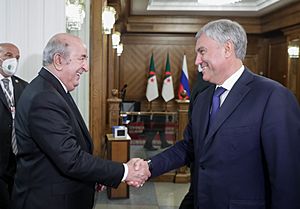
In May 2023, he called a drone attack on the Kremlin a "terrorist attack." He compared the Ukrainian government to terrorist groups. He also said that the "special military operation" in Ukraine "was inevitable."

In November 2023, he met with Chinese President Xi Jinping in Beijing. They discussed working together more closely. This included cooperation in groups like the Shanghai Cooperation Organization and BRICS.
In February 2024, Mr. Volodin blamed "Washington" and "Brussels" for the death of opposition leader Alexei Navalny.
Honours and Awards
Vyacheslav Volodin has received several awards for his service:
- Order of Friendship (1997)
- Order of Honour (2003)
- Order "For Merit to the Fatherland" 4th class (2006); 2nd class (2012)
See also
 In Spanish: Viacheslav Volodin para niños
In Spanish: Viacheslav Volodin para niños
 | Bayard Rustin |
 | Jeannette Carter |
 | Jeremiah A. Brown |


